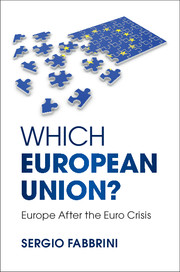Book contents
- Frontmatter
- Dedication
- Contents
- List of boxes
- List of figures
- List of tables
- List of abbreviations
- Preface – How many unions?
- Acknowledgments
- Part I Institutionalization of multiple unions
- Part II Main perspectives on the European Union
- Part III Towards the compound union perspective
- 7 Comparing democratic models
- 8 Compound unions and the EU
- 9 A new political order in Europe
- Appendix
- Glossary
- References
- Index
8 - Compound unions and the EU
Published online by Cambridge University Press: 05 March 2015
- Frontmatter
- Dedication
- Contents
- List of boxes
- List of figures
- List of tables
- List of abbreviations
- Preface – How many unions?
- Acknowledgments
- Part I Institutionalization of multiple unions
- Part II Main perspectives on the European Union
- Part III Towards the compound union perspective
- 7 Comparing democratic models
- 8 Compound unions and the EU
- 9 A new political order in Europe
- Appendix
- Glossary
- References
- Index
Summary
Introduction
Having identified the model of democracy of unions of states, it is then possible to investigate whether that model fits the democratic functioning of the EU. Certainly, it might be questioned whether the EU can even be considered a democracy (Majone 2009). However, as shown in Part I, there are good arguments for considering the EU as a democracy. A polity may be considered democratic (Dahl 1989: Part 3 and Part 4) when it is regulated by a higher legal order, it protects the fundamental rights of its citizens and the decision-making system meets basic criteria of representation and accountability (Mény and Surel 2002). The EU is a constitutionalized polity, although contrasted and contested, based on treaties interpreted as a quasi-constitution (or as a material constitution) and on a Charter of Fundamental Rights finally recognized by the Lisbon Treaty. Moreover, those who take decisions in the supranational EU are elected by citizens either in national elections (governmental leaders of the European Council and ministers of the Council) or in European elections (MEPs), or (as is the case for the president and commissioners of the Commission) nominated through an interlocking decision-making process started by politicians elected in national elections (leaders of the European Council) and concluded by politicians elected in European elections (MEPs). Finally, the supranational EU satisfies both inter-institutional and electoral accountability (Morlino 2012). EU decision-makers are compelled to act within a complex system of inter-institutional controls and, at the same time, all of them are subject to the control of national constitutional courts and the ECJ, thus satisfying inter-institutional accountability. At the same time, EU decision-makers have to face the periodical evaluation of the voters, at both national and European level, thus satisfying electoral accountability as well. Of course, the existence of a growing intergovernmental side of the EU, with its confusion of powers, has made the democratic functioning of the EU much more problematic.
Defining the EU as a democratic polity does not mean shielding it from criticism. However, criticisms, albeit of a different nature, might also be addressed to each and every national democracy.
- Type
- Chapter
- Information
- Which European Union?Europe After the Euro Crisis, pp. 219 - 256Publisher: Cambridge University PressPrint publication year: 2015



